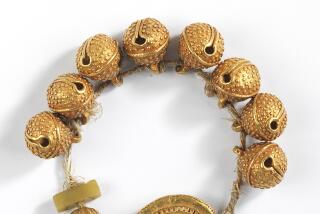Eritrea’s rise from pawn to free nation
- Share via
I Didn’t Do It for You
How the World Betrayed a Small African Nation
Michela Wrong
HarperCollins: 432 pp., $25.95
*
ITALY, a latecomer to the European scramble for a foothold in Africa, became the master of the east African territories consolidated under the name Eritrea in the final decade of the 19th century. So little coveted by European powers was this barren, torrid land on the Red Sea that Britain, in the ultimate act of condescension, lent a helping hand to its conquest, providing Italy’s naval commanders with an exact map of the cannons defending the port of Massawa, which was then in Egyptian hands.
So began the Italian adventure in lands along the Horn of Africa, the crucial trade route to the Gulf of Aden, the Arabian Sea and the Indian Ocean, which British journalist Michela Wrong recounts in “I Didn’t Do It for You: How the World Betrayed a Small African Nation.” Hers is a tale of Africa’s newest country, Eritrea, and its history as a pawn in the power politics of European empires and the Cold War, before gaining independence from Ethiopia in 1993, when the area ceased to have any strategic value to either the United States or the former Soviet Union.
Wrong, a former correspondent for Reuters, the BBC and the Financial Times, tells how 19th century Italian officials succumbed to a mirage of colonial megalomania. In their operatic panegyrics about the colony, they glossed over the realities of this inhospitable soil, envisioning an Eden that would rival America as a destination for Italian emigrants. She writes that leaders in Rome “fondly believed Africa’s original inhabitants were destined to wither away, ceding their land to a stronger, white skinned race.”
Yet by the standards of the time, Italian rule was mostly benign, the author shows. The Italians built railroads and factories. They exported their passion for cycling, which remains Eritrea’s national sport. During World War I, Italy’s African colonies slipped into oblivion until Mussolini’s imperial ambitions in the 1930s brought them back to the fore. Construction boomed and avant-garde architects turned the Eritrean capital Asmara into a showcase for Art Deco buildings. Arguably, it was the most modern city on the continent, boasting “more traffic lights than Rome itself.”
Eritrea went into decline again when the British defeated the Italian army. Britain proceeded to strip Eritrea of its industrial assets and shipped them to its colonies, such as Kenya and Tanzania.
The evils of European colonialism would pale beside Ethiopian domination that followed in the 1950s under Haile Selassie, who claimed direct lineage from the Queen of Sheba and King Solomon. Thousands should die of starvation rather than forcing the kingdom into the indignities of accepting foreign aid, a court minister said. This pattern of wanton cruelty would worsen under the Communist regime that overthrew Selassie in 1974.
Wrong provides a very readable journalistic narrative on Eritrea and its neighbor and rival, Ethiopia, their emergence as independent nations and the border wars they could ill afford. The book gives insights into the Eritrean rebel movement and its daring acts of sabotage.
But it has flaws similar to those of Wrong’s 2001 book, “In the Footsteps of Mr. Kurtz,” widely considered the definitive account of the tyranny of Mobutu Sese Seko in Congo (then, Zaire). The religious divide between Eritrea’s Orthodox Christians and Muslims and their divided loyalties are mentioned only in passing. Only cursory attention is given to a split within the Eritrean rebel movement. Conversely, a whole chapter is dedicated to the private excesses of the GIs at the Selassie-era U.S. listening post at Kagnew, which is irrelevant to the nation’s modern history. Moreover, the author relies heavily on secondary sources from outside the country, often leaving the reader with the nagging feeling that the Eritreans are missing from the picture.
Yet Wrong compensates with rich prose and the passion she brings to the subject of the nation’s independence. In one vignette, her taxi driver gets out of the car to be greeted by the very ministers she was arriving to interview. He was, it turned out, one of the longest-serving fighters in the rebel movement. Eritrea is not utopia, but it may be making a good try at it.
*
Avedis Hadjian, a former writer and editor for CNN online, is a frequent contributor to Book Review.
More to Read
Sign up for Essential California
The most important California stories and recommendations in your inbox every morning.
You may occasionally receive promotional content from the Los Angeles Times.













